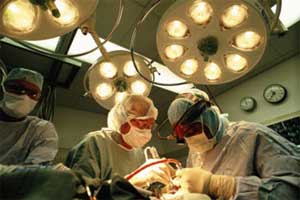- Home
- Editorial
- News
- Practice Guidelines
- Anesthesiology Guidelines
- Cancer Guidelines
- Cardiac Sciences Guidelines
- Critical Care Guidelines
- Dentistry Guidelines
- Dermatology Guidelines
- Diabetes and Endo Guidelines
- Diagnostics Guidelines
- ENT Guidelines
- Featured Practice Guidelines
- Gastroenterology Guidelines
- Geriatrics Guidelines
- Medicine Guidelines
- Nephrology Guidelines
- Neurosciences Guidelines
- Obs and Gynae Guidelines
- Ophthalmology Guidelines
- Orthopaedics Guidelines
- Paediatrics Guidelines
- Psychiatry Guidelines
- Pulmonology Guidelines
- Radiology Guidelines
- Surgery Guidelines
- Urology Guidelines
ARF occurs less frequently in CKD patients after PCI compared to CABG

Patients with chronic kidney disease (CKD) undergoing revascularization in the EXCEL trial had an increased rate of acute renal failure (ARF) and reduced event-free survival. ARF occurred less frequently with percutaneous coronary intervention (PCI) than coronary artery bypass graft (CABG). However, both CABG and PCI carry a similar three-year risk of heart attack, stroke or death in patients with and without CKD.
These are the findings from the subgroup analysis of the EXCEL (Evaluation of XIENCE Versus Coronary Artery Bypass Surgery for Effectiveness of Left Main Revascularization) trial, published in the Journal of the American College of Cardiology (JACC).
The optimal revascularization strategy for patients with left main coronary artery disease (LMCAD) and CKD remains unclear. Gennaro Giustino, Cardiovascular Research Foundation, New York, and colleagues conducted the study to investigate comparative effectiveness of PCI versus CABG surgery in patients with LMCAD and CKD.
Patients with left main coronary artery disease randomized to percutaneous coronary intervention (PCI) or coronary artery bypass graft (CABG) surgery were followed to compare outcomes in those with and without chronic kidney disease (CKD).
CKD was defined as an estimated glomerular filtration rate <60 ml/min/1.73 m2 using the CKD Epidemiology Collaboration equation. Acute renal failure (ARF) was defined as a serum creatinine increase ≥5.0 mg/dl from baseline or a new requirement for dialysis. The primary composite endpoint was the composite of death, myocardial infarction (MI), or stroke at 3-year follow-up.
Also Read: CABG has more AF,Stroke risk than PCI in LMCAD -EXCEL Trial
Key Results:
- CKD was present in 361 of 1,869 randomized patients (19.3%) in whom baseline estimated glomerular filtration rate was available.
- Patients with CKD had higher 3-year rates of the primary endpoint compared with those without CKD (20.8% vs. 13.5%).
- ARF within 30 days occurred more commonly in patients with compared with those without CKD (5.0% vs. 0.8%) and was strongly associated with the 3-year risk of death, stroke, or MI (50.7% vs. 14.4%).
- ARF occurred less commonly after revascularization with PCI compared with CABG both in patients with CKD (2.3% vs. 7.7%) and in those without CKD (0.3% vs. 1.3%).
- There were no significant differences in the rates of the primary composite endpoint after PCI and CABG in patients with CKD (23.4% vs. 18.1%) and without CKD (13.4% vs. 13.5%).
“Both PCI and CABG are thus acceptable revascularization approaches in selected high-risk patients with LMCAD (left main coronary artery disease) and CKD,” concluded the authors. “Individual patient comorbidities, the likelihood to safely obtain complete revascularization, and patient preferences as to the early benefits of PCI versus the late benefits of CABG should thus be factored into the heart team decision-making process in high-risk patients with LMCAD and CKD.”
For more information log on to 10.1016/j.jacc.2018.05.057

Disclaimer: This site is primarily intended for healthcare professionals. Any content/information on this website does not replace the advice of medical and/or health professionals and should not be construed as medical/diagnostic advice/endorsement or prescription. Use of this site is subject to our terms of use, privacy policy, advertisement policy. © 2020 Minerva Medical Treatment Pvt Ltd